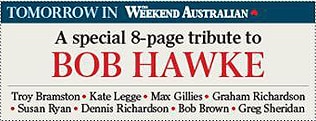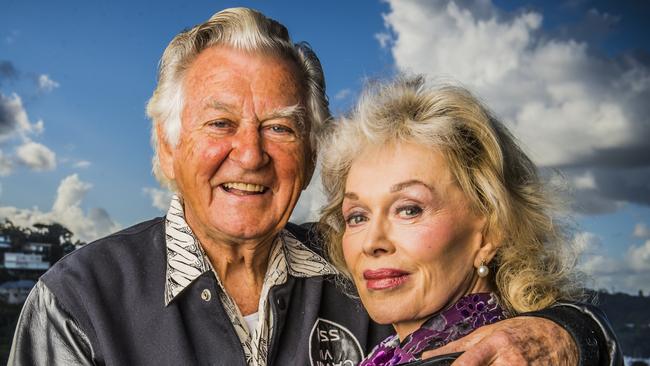Bob Hawke: from larrikin to legend
Millions beyond the political class today mourn a man who believed in this country’s greatness.
Bob Hawke is dead.
The former Australian Labor prime minister, union organiser, Rhodes scholar; the bold reformer; the great debater; the father, the lover, our silver-haired larrikin son, died at home in Sydney yesterday. He was 89.
Hawke — full name Robert James Lee Hawke, born December 9, 1929 — was surrounded by those who loved him: his wife, his children, his grandchildren. His death was announced by his widow, Blanche d’Alpuget, who said: “Today we lost Bob Hawke, a great Australian. He foresaw the Asian century. He abhorred racism. Bob was dearly loved … the golden bowl is broken.”
His successor in office, his rival, his fierce combatant, his comrade Paul Keating said: “With Bob Hawke’s passing today, the great partnership I enjoyed with him passes too — a partnership we forged with the Australian people.”
The serving prime minister, Scott Morrison, also paid tribute: “Bob Hawke was a great Australian who led and served our country with passion, courage and intellectual horsepower that made our country stronger.”
Bill Shorten, who this weekend aims to become the next Labor leader in The Lodge, spoke tenderly of his mentor: “The Australian people loved Bob Hawke because they knew Bob loved them. The Labor Party gives thanks for the life of our longest-serving prime minister and Australians everywhere remember and honour a man who gave so much to the country and people he cared for so deeply.”
Beyond the walls of Hawke’s Sydney home, millions beyond the political class today mourn a man who believed in this country’s greatness; whose self-confidence became Australia’s confidence, especially on the world stage.
Hawke led Labor to a landslide victory at the 1983 election, and he led them into battle again, in 1984, 1987 and 1990. He was victorious every time.
No other Labor leader has won so many, or served so long.

The first Hawke ministry stands as one of the greatest ever assembled. His partnership with Mr Keating laid the foundation for a modern Australia, opening this nation to the world. Their friendship would ultimately dissolve into bitter rivalry, the wound only recently healed.
Hawke pushed Australia on to the world stage, established this nation as the voice of fairness and decency, in matters of great importance.
He was magnificent on Israel. On apartheid. On Antarctica. On French nuclear testing in the Pacific.
He was pragmatic and charismatic. He liked the finer things — cigars — but then again, also beer by the yard glass.
He had a rare intimacy with the Australian people, which made sense: he loved this country, and shared its pursuits: he was happiest with binoculars up, form guide under his armpit.
His finest ever line — “Any boss that sacks a worker for not turning up is a bum!” — was delivered after Australia’s victory in the America’s Cup.
We saw him laughing; at times, we saw him in tears.
Hawke was bold, authentic, stubborn. Towards the end of` his political career, he was also bitter, but not for long: he made a fortune in business, built a mansion, married his long-time lover, and so became a statesman of this great country, to which he was devoted, and of which he was a favourite son.





To join the conversation, please log in. Don't have an account? Register
Join the conversation, you are commenting as Logout